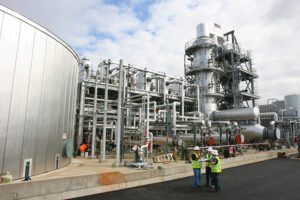JEFFERSON CITY, MO – The Northeast heating oil industry is on track to achieve the ambitious goals set forth in the Providence Resolution, a landmark commitment made in 2019 to voluntarily reduce greenhouse gas emissions. The resolution, which was unanimously approved by over 300 industry leaders, calls for a 15% reduction in greenhouse gas (GHG) emissions by 2023, a 40% reduction by 2030, and net-zero carbon emissions by 2050.
According to a new analysis by Dr. Tom Butcher of the National Oilheat Research Alliance (NORA), the industry has surpassed its goal of reducing GHGs 15% by 2023, achieving a nearly 26% reduction in greenhouse gas emissions through a combination of energy efficiency improvements and increased use of renewable fuels such as Bioheat® Fuel, a blend of sustainable biodiesel with conventional home heating oil.
“The heating oil industry has made significant strides in reducing its carbon footprint over the past five years,” said Sean Cota, President & CEO of the industry’s Washington-based trade association, the National Energy & Fuels Institute (NEFI).
“These mostly small, multi-generational family businesses are playing an outsized role in carbon reduction in the Northeast,” Cota added. “They will continue to prove pivotal in the years to come as governments at all levels seek to achieve ambitious greenhouse gas reduction goals in a manner that is equitable and achievable, and that preserves energy security and reliability.”
At its sixth annual industry summit, held in Weehawken, New Jersey this week, the industry celebrated numerous successes and innovations, including:
- UL standards that recognize higher biofuel blends in oil-fired heating equipment
- Manufacturers introducing burners and heating systems to the market that are certified for blends of up to 100% biodiesel (B100)
- New federal tax credits for homeowners who upgrade to more efficient oil-fired furnaces and boilers that are designed for use with higher blends of renewable fuels
- Securing federal grants for downstream biofuel infrastructure investments for heating oil
Working closely with state governments, heating oil state associations advocated for biofuel blending requirements in Connecticut, New York and Rhode Island that will eventually require blends as high as 50-percent. Additionally, heating oil blended with biofuels are expected to generate credits under emerging “clean heat standards” now being developed in Massachusetts and Vermont, and in the early stages of development in several other Northeast states.
Renewable fuels have proven to be an immediate, cost-effective, and equitable means of reducing emissions in the building sector, particularly for the nearly five million Northeast homes and businesses that rely on heating oil dealers for warmth and comfort each winter.
“There is still work ahead, and we are ready for the challenge,” said NEFI Board Chair Ray Hart, a full-service heating oil dealer based out of Long Island, New York.
“This is an industry of hard-working American men and women that care deeply for their neighbors, their local communities, and the environment,” he said. “Together, we can achieve great heights.”
ABOUT THE NATIONAL ENERGY & FUELS INSTITUTE (NEFI)
Since 1942, NEFI has been a leading voice for wholesale and retail liquid heating fuel distributors and related services companies in Washington, DC and throughout the country. Its members are mostly small, multigenerational family businesses that deliver warmth and comfort to millions of American homes. NEFI hosts annual summits, such as today’s event in Weehawken, NJ, that provide an opportunity for stakeholders to gather and discuss pathways to voluntarily achieve carbon reduction goals consistent with industry commitments, including widespread deployment of renewable liquid heating fuels and high efficiency technologies. More at www.nefi.com.
Contact: Heather Buechter, 479-651-7301, hbuechter@cleanfuels.org
ABOUT CLEAN FUELS ALLIANCE AMERICA
Made from an increasingly diverse mix of resources such as recycled cooking oil, soybean oil, and animal fats, the clean fuels industry is a proven, integral part of America’s clean energy future. Clean Fuels Alliance America is the U.S. trade association representing the entire biodiesel, renewable diesel and sustainable aviation fuel supply chain, including producers, feedstock suppliers and fuel distributors. Clean Fuels receives funding from a broad mix of private companies and associations, including the United Soybean Board and state checkoff organizations.





